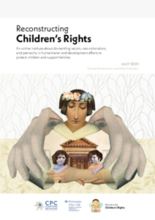This webinar, the fourth in a series from the Transforming Children's Care Global Collaborative Platform, explored the importance of protecting the child’s right to identity in how it is created, how it may be modified and/or falsified in alternative care as well as the need to preserve information about the child’s identity, notably family relations.
In this video from the Guardian, Leyland Cecco explains how the discovery of more than 1,000 unmarked graves on the grounds of former church-run residential schools in Canada is just the tip of the iceberg in uncovering Canada's traumatic colonial past.
Accurate and reliable data on children living in residential care institutions are essential. However, these children are not identified through household surveys and, as a result, are not typically included in official national statistics on key indicators of child well-being. This includes indicators that comprise global monitoring frameworks, such as the Sustainable Development Goals. To help address this data gap, UNICEF has developed the first-ever comprehensive package to collect data on children living in residential care settings. Claudia Cappa, Senior Adviser for Statistics and Monitoring, Data and Analytics Section, DAPM/UNICEF HQ, explains more.
This two-part launch event reveals research, insights, and a new, 7-point plan for how to achieve equality in care work, launched in this year’s State of the World’s Fathers 2021 report.
In this video, "CNN's Vedika Sud speaks to the eldest sister-- now the primary caretaker of a family of seven siblings who lost their mother and then their father to the brutal second wave."
In this webinar, members of the International Parent Advocacy Network discussed parent advocacy and presented the literature review International Review of Parent Advocacy in Child Welfare: Strengthening Children's Care and Protection Through Parent Participation. The webinar included presentations from parent advocates who shared examples of parent advocacy in their contexts.
In this webinar, prevention experts discuss the process, experiences, and challenges of the ongoing integration of IPV prevention and gender into the Investing in Children and their Societies (ICS) Skilful Parenting Programme, and inclusion of VAC in the Indashyikirwa couples IPV prevention programme.
The goal of the Reconstructing Children’s Rights Institute is to raise awareness and recognition of how racism, patriarchy, and power permeate the international child rights and child protection field. Building on Conversation #1, this session expands our political imagination by delving deeper into the international children’s rights and child protection space.
This session’s speakers discussed the funding ecosystem’s challenges and barriers and highlighted examples of how innovative funding mechanisms are reinventing donor giving by shifting resources and power closer to the children, young people, families, and communities they are meant to support.
The WHO South-East Asia Regional Office in collaboration with UNICEF organized a 3-day virtual meeting from 27 to 29 April, 2021.


